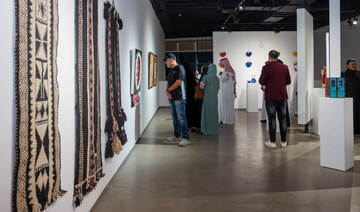JEDDAH: The Saudi Authority of Intellectual Property (SAIP) announced that it has confiscated and destroyed more than 5.5 million items in 2020 that were found to be violating the country’s intellectual property (IP) regulations.
“These items included pirated DVDs, CDs and books; and illegal desktops, laptops, hard disks, memory chips, TV satellite boxes and CD-copying devices. We also cooperated with Saudi Customs to seize and destroy more than 2 million counterfeited products. These included shoes, clothes, mobile accessories, sanitary ware and car filters, all bearing well-known trademarks from major international companies,” said Yasser Al-Debassi, executive director of IP Respect at SAIP.
SAIP seeks to improve the protection of IP by developing its enforcement system, ensuring the quality of its operations and increasing transparency between itself and the private sector.
In its recently released 2020 report, SAIP said that it had received 67 cases directly from plaintiffs, who reported their complaints to the authority.
It added that 115 cases were conducted through inspection visits to websites. Over 300 cases were conducted through other online inspections, while 42 cases were referred to SAIP by the Ministry of Media.
The report revealed that most of the IP infringements occurred in the Saudi capital, Riyadh, with a rate of 61 percent. Makkah ranked second with 24 percent, while the Eastern Province came third with 14 percent.
The remaining 9 percent of violations took place in other Saudi cities. However, the report said, some complaints were dismissed for “uncompleted requirements.”
The report added that most cases were art-related, involving the infringement of rights for photographs, audio, videos, and designs. Literary cases and research formed 25 percent of the total number of cases, while software infringement cases reached 12 percent.
a responded to more than 5,790 emails and phone calls, reporting violations through its different communication channels.
It confirmed in its report that 119 resolutions were issued by the copyright committee, assigned to review violations of the copyright law.
“The IP Respect surveillance team has visited and examined over 1,350 websites and detected 308 violated websites. It filed the cases to the Permanent Internet Committee, who ruled that these websites be blocked,” Al-Debassi told Arab News. “Fines of more than SR255,000 ($68,000) were imposed on the violators. The violations ranged from literary works to sports TV broadcasting.”
The authority launched online inspection campaigns to block the websites, which, without permission from right owners, either posted copyrighted photos and graphics on social media platforms; exhibited copies of copyrighted books and magazines; and allowed for the viewing and download of copyrighted series, movies or pirated software.
SAIP also launched copyright-enforcement campaigns in Riyadh, Makkah, Jeddah, Dammam, Alkhobar, and Al-Ahsa, with the aim of stopping all infringement activities and copyright-related violations in computer software and programs, satellite broadcasting, and printed or audiovisual materials.
The sectors targeted by the campaigns included video, electronics, computer maintenance and students’ services stores, which provide document-copying services.
“SAIP is currently working on tracking new piracy trends and addressing the challenges facing industries. It is doing its best to ensure compliance with IP laws and regulations in the Kingdom in order to maintain an attractive business environment,” Al-Debassi said.
SAIP has launched a number of initiatives at the national level, including a national enforcement committee for IP.
It is also working closely with its partners in the private sector, global associations and IP protection offices to fight piracy.
“SAIP has partnered with right holders to combat counterfeiting. We have conducted meetings with our partners from tech companies, such as Microsoft, to discuss the latest methods of piracy for its software and operating systems. The authority has also met with media company OSN to discuss the challenge of illegal Internet Protocol television boxes and subscriptions,” Al-Debassi added.
Saudi intellectual property authority confiscates, destroys millions of products in violation of laws
https://arab.news/z8kbr
Saudi intellectual property authority confiscates, destroys millions of products in violation of laws

Young Saudi rug makers weave kaleidoscope of dreams

- Bassam Al-Khalifi, Saud Al-Rasheed master the art of tufting rugs
RIYADH: In the wake of the pandemic Bassam Al-Khalifi and Saud Al-Rasheed transformed their isolation into creativity, leading to the birth of Ghazlah Studio — a hub for unique, hand-tufted rugs.
The Saudi men’s story is not just about artistry but a testament to how challenging times can inspire innovation and passion.
Al-Khalifi’s journey began when he sought to decorate his room. Frustrated by the lack of appealing rugs in the market, he decided to create his own.
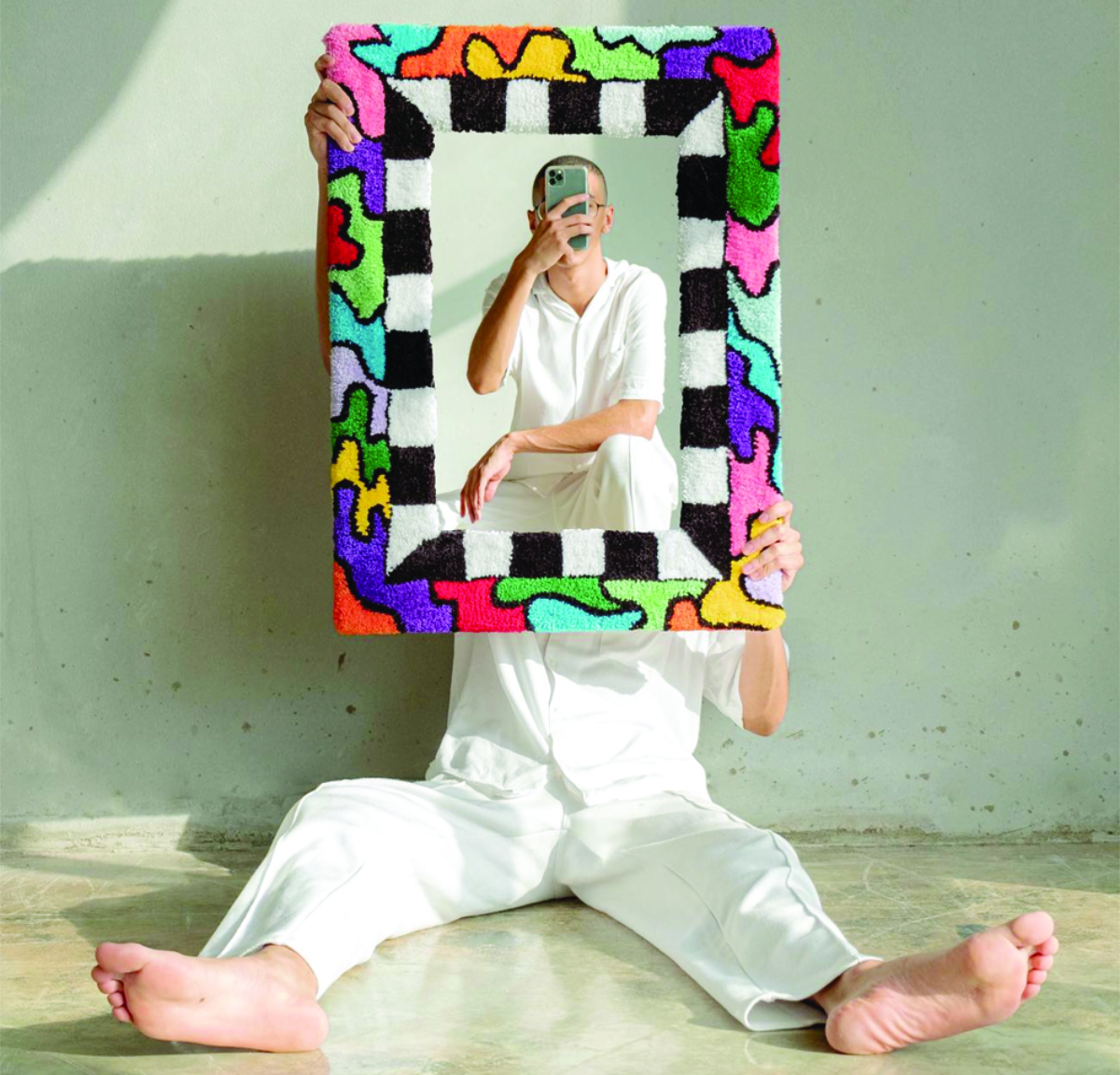
“I wanted something different, so I ordered the equipment and dedicated a year to learning how to tuft,” he told Arab News. What started as a personal project quickly evolved into a larger vision.
Initially, neither Al-Khalifi, an artist and designer, nor Al-Rasheed, an avid art collector, had any experience in weaving. They faced a steep learning curve but were undeterred.
“We took six months to learn how to conceive designs, source materials, and weave the rugs,” Al-Khalifi explained.
HIGHLIGHTS
• The journey of Ghazlah Studio began when Bassam Al-Khalifi, frustrated by the lack of appealing rugs in the market, decided to create his own.
• Their debut collection titled ‘Color as a Scene’ evokes a range of emotions, reflecting the complex sentiments many experienced during the pandemic.
They experimented with various techniques, ultimately settling on a “cut and loop” method using 100 percent acrylic yarn. This approach stands in contrast to traditional Arabian carpet-making methods which often utilize wool and time-honored designs.
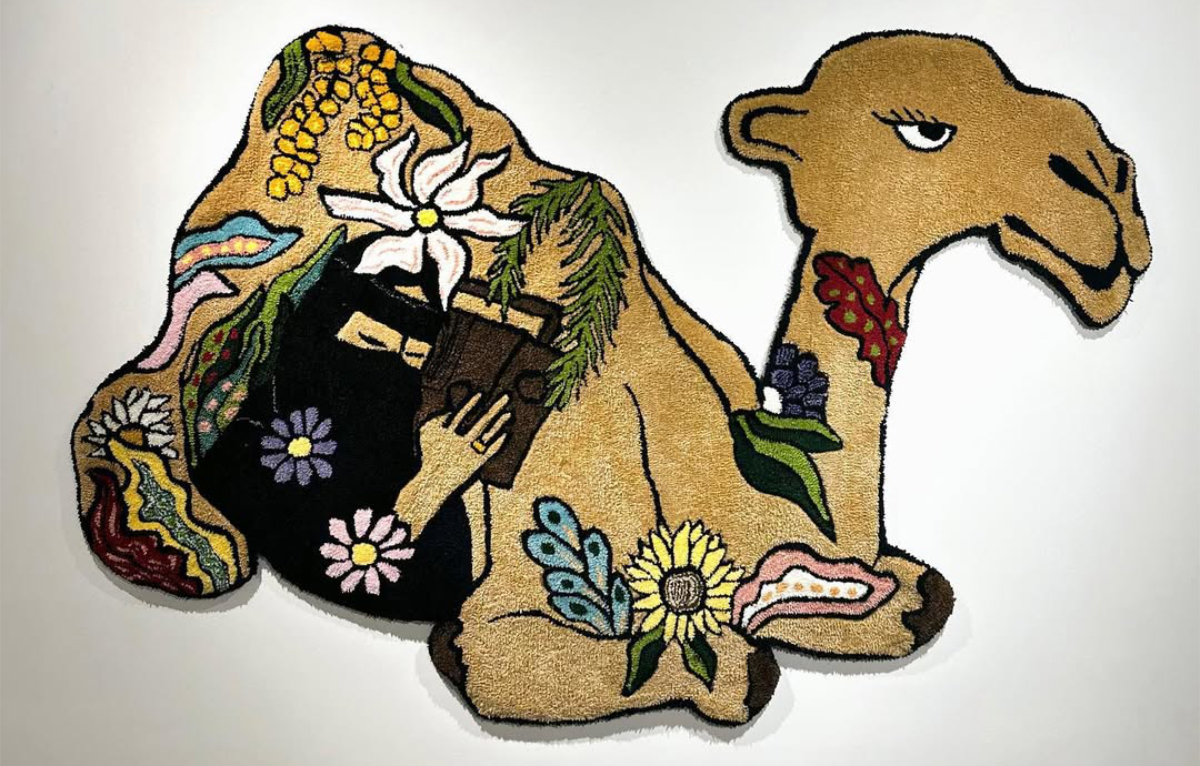
Their learning process was filled with challenges, but their determination pushed them forward.
Al-Khalifi pored over tutorials, consulted with experts, and practiced tirelessly. Al-Rasheed, with his keen eye for aesthetics, contributed by curating color palettes and design concepts.
What started as a hobby soon blossomed into a commercial venture. With their rugs gaining traction, Al-Khalifi and Al-Rasheed launched Ghazlah, featuring a debut collection titled “Color as a Scene.”
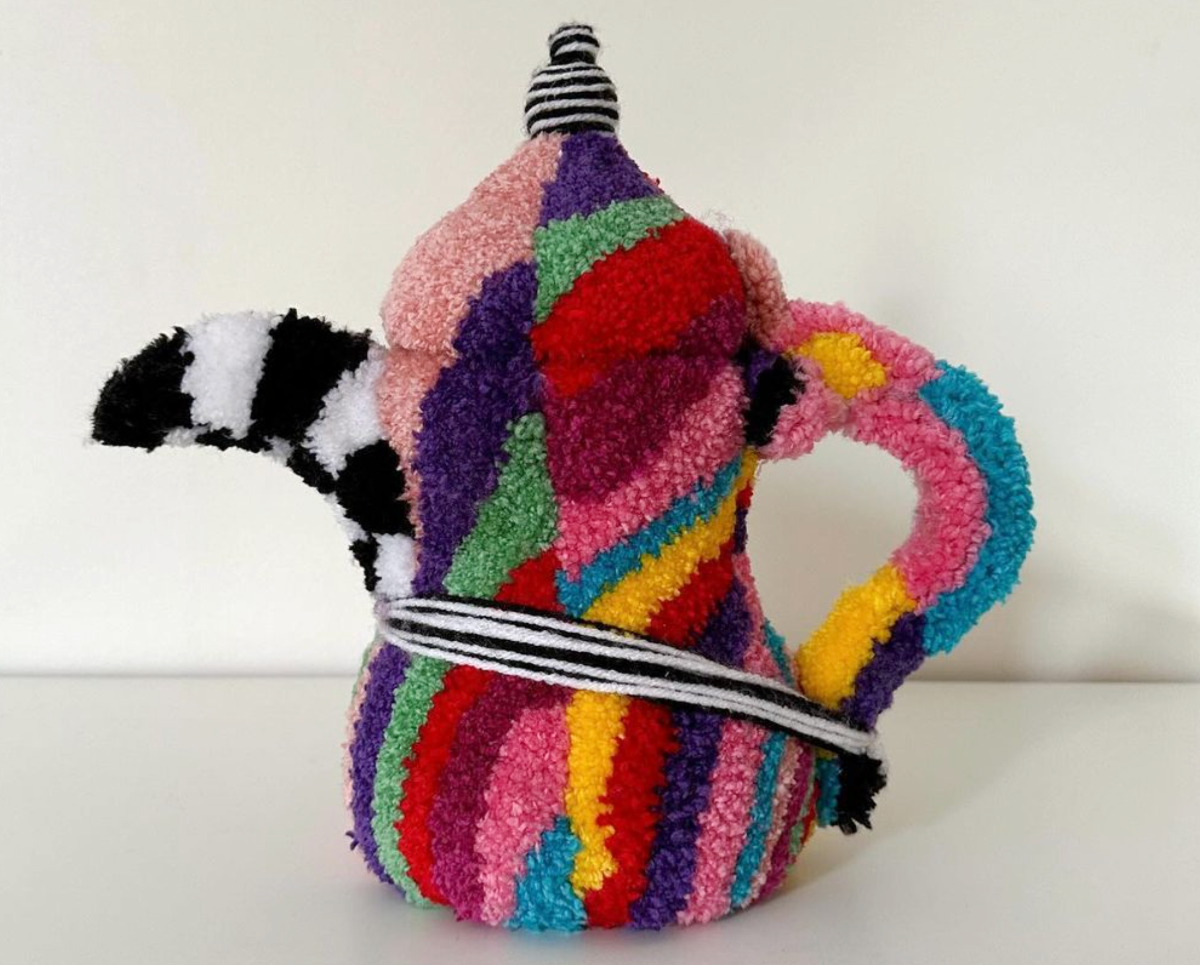
The collection evokes a range of emotions, reflecting the complex sentiments many experienced during the pandemic. “I wanted to splash all these emotions on the piece itself,” Al-Khalifi said. The vibrant tapestries of feelings capture the essence of joy, nostalgia, and hope.
The vibrance of their work makes a statement piece in any room. Each piece is unique, with some featuring Saudi themes that enhance their significance and appeal. The artists also draw inspiration from their heritage, incorporating traditional motifs and modern designs, creating a fusion that resonates with a broad audience.
In Ghazlah’s Riyadh workshop, the atmosphere is filled with creativity and energy. The walls are lined with neatly organized shelves filled with spools of yarn in every imaginable color. There are some of Al-Khalifi’s paintings and rugs still in progress, showcasing their journey.
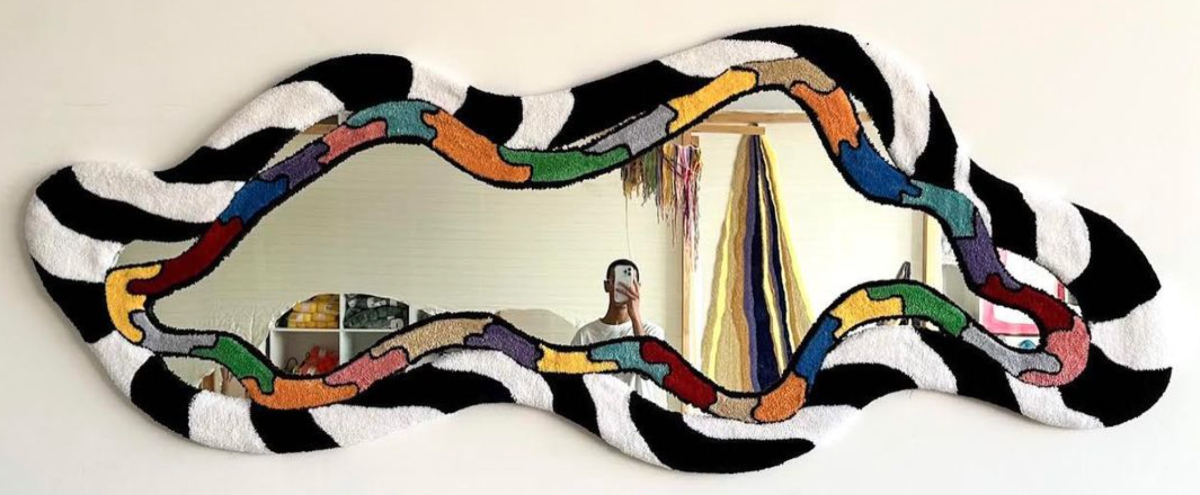
Al-Rasheed gestured around the space, saying: “This place is full of rugs that we made but decided not to sell. Why? Because we love them. I’m trying to push Al-Khalifi to sell them, but he won’t.”
Ghazlah Studio has made a notable impact in Riyadh, showcasing creations in three galleries. Their work has garnered attention not just locally but also from international platforms, leading to collaborations with major brands such as Vogue and Sephora.
These partnerships have elevated their profile and allowed them to reach a wider audience with which they can share their artistry and craftsmanship.
The duo’s success can also be attributed to their innovative marketing strategies. They leverage social media to share their creative process, engage with customers, and build a community around their brand.
By showcasing behind-the-scenes footage, they invite their audience into their world, allowing them to witness the transformation of raw materials into stunning art pieces.
As they continue to grow, Al-Khalifi and Al-Rasheed are committed to exploring new design possibilities, as well as looking into creating home decor items. They plan to expand their collections, experimenting with different textures, materials, and techniques.
From a simple idea born during quarantine to a noteworthy business, Ghazlah Studio continues to make waves in the art scene, proving that even in isolation, inspiration can thrive.
As they weave their stories into every rug, Al-Khalifi and Al-Rasheed invite us all to find beauty and meaning in our own creative pursuits.
Hail governor inaugurates Middle East’s largest salmon production center

- The 10,000-square-meter facility features the latest marine technology
HAIL: Prince Abdulaziz bin Saad bin Abdulaziz, the governor of Hail, inaugurated the Excellence Center for Salmon Production on Saturday, the largest facility of its kind in the Middle East.
A collaboration between the Ministry of Environment, Water, and Agriculture and King Abdulaziz University, the center aims to produce 100,000 tons of salmon annually, bolstering Saudi Arabia’s food security and aquaculture sector, the Saudi Press Agency reported.
The 10,000-square-meter facility features the latest marine technology, including recirculating aquaculture systems and aquaponics units, which integrate fish and vegetable production.
It is designed to reduce the Kingdom’s reliance on salmon imports, currently at 23,000 tons per year.
Prince Abdulaziz hailed the project as a cornerstone of Vision 2030, promoting sustainable development and economic diversification, while attending officials highlighted its potential to enhance innovation, create jobs, and serve as a model for sustainable aquaculture in the region, SPA added.
Islamic minister highlights Saudi Arabia’s role in promoting peace

- European guests praise Saudi Arabia’s hospitality, cultural outreach efforts
JEDDAH: Saudi Arabia’s Ministry of Islamic Affairs hosted a cultural event for the second group of Guests of the Custodian of the Two Holy Mosques’ Program for Umrah and Visit, featuring various cultural and entertainment activities.
The group comprised 250 pilgrims from 14 European countries, the Saudi Press Agency reported.

They expressed their gratitude to the leadership and the ministry for hosting them, allowing them to perform Umrah rituals and visit historic sites in Madinah and Makkah.
Minister of Islamic Affairs Sheikh Abdullatif Al-Asheikh said Saudi Arabia, under the leadership of King Salman and Crown Prince Mohammed bin Salman, was committed to being a beacon of goodness and moderation.
HIGHLIGHT
The minister also highlighted the Kingdom’s commitment to providing humanitarian aid to those in need around the world, in line with Islam’s core values of promoting compassion and support.
During a reception for the guests, he said the Kingdom would continue to serve Islam and Muslims, and promote tolerance, coexistence and understanding worldwide.
Al-Asheikh, who is also the general supervisor of the program, met the guests, conveyed the greetings of the Saudi leadership and along with members of the program’s working committees reviewed the services provided and received a briefing on their work.
Under its leadership, the Kingdom strove to offer top-tier services to the visitors of the Two Holy Mosques from around the world, he said.
The guests commended the Kingdom on its efforts to promote Islam’s message of tolerance and foster appreciation for its historical and spiritual legacy. They also praised the new projects and expansions at the holy mosques and sites, which align with Saudi Vision 2030.
Al-Khamar Al-Baqari, head of imams in the Netherlands, expressed his gratitude to Saudi Arabia, its government and its people for their hospitality.
Sheikh Ali Al-Zughaibi, the program’s executive director, said that since its launch in 2014 it had provided the opportunity for 4,500 men and women from around the world to perform Umrah and visit the Prophet’s Mosque.
Al-Asheikh also highlighted the Kingdom’s unwavering commitment to providing humanitarian aid to those in need around the world, in line with Islam’s core values of promoting compassion and support.
Art, animals take center stage at Riyadh camel festival

- The combination of arts and animals makes the event an appealing option for visitors and supports the economic and cultural growth of the Kingdom
RIYADH: The works of a renowned local sculptor are among the creative highlights of this year’s King Abdulaziz Camel Festival, which celebrates not only ships of the desert but arts and crafts from around the Kingdom.
Abdulrahman Al-Zahem is best known for his depictions of camels and traditional tools. Each of his pieces serves as a symbol of the Kingdom’s heritage and connection to the land, the Saudi Press Agency reported.
FASTFACT
The combination of arts and animals makes the King Abdulaziz Camel Festival an appealing option for visitors and supports the economic and cultural growth of the Kingdom.
As well as creating his own works, Al-Zahem spends much of his time helping to nurture the next generation of artists, including his own daughter.
Besides providing a global hub for all things camel, the festival in Al-Sayahid, northeast of Riyadh, is an important platform for the arts, offering an opportunity for artists to showcase their work to a global audience.
The combination of arts and animals also makes the event an appealing option for visitors and supports the economic and cultural growth of the Kingdom.
The festival ends on Tuesday.
Riyadh’s Souq Al-Awaleen celebrates Saudi traditions

- Souq Al-Awaleen features handicrafts, folk art, and live performances reflecting the Kingdom’s cultural heritage and providing a platform for local artisans to showcase their work and revive traditional crafts
RIYADH: Souq Al-Awaleen, a part of Riyadh Season, offers a “captivating journey through Saudi traditions,” according to a recent Saudi Press Agency report.
The souq, entry to which is free, “blends traditional elements with modern touches, creating a vibrant cultural hub,” the SPA continued.
Souq Al-Awaleen features handicrafts, folk art, and live performances reflecting the Kingdom’s cultural heritage and providing a platform for local artisans to showcase their work and revive traditional crafts. Visitors can also participate in workshops focused on Sadu weaving and pottery.
Sufrat Al-Deira, meanwhile, offers “a taste of authentic Saudi cuisine,” the SPA reported, adding that the “atmosphere evokes a bygone era, with activities like cooking demonstrations and cultural performances enriching the experience.”
Riyadh Season runs until March 2025, and has already been attended by more than 12 million people, according to the SPA.












